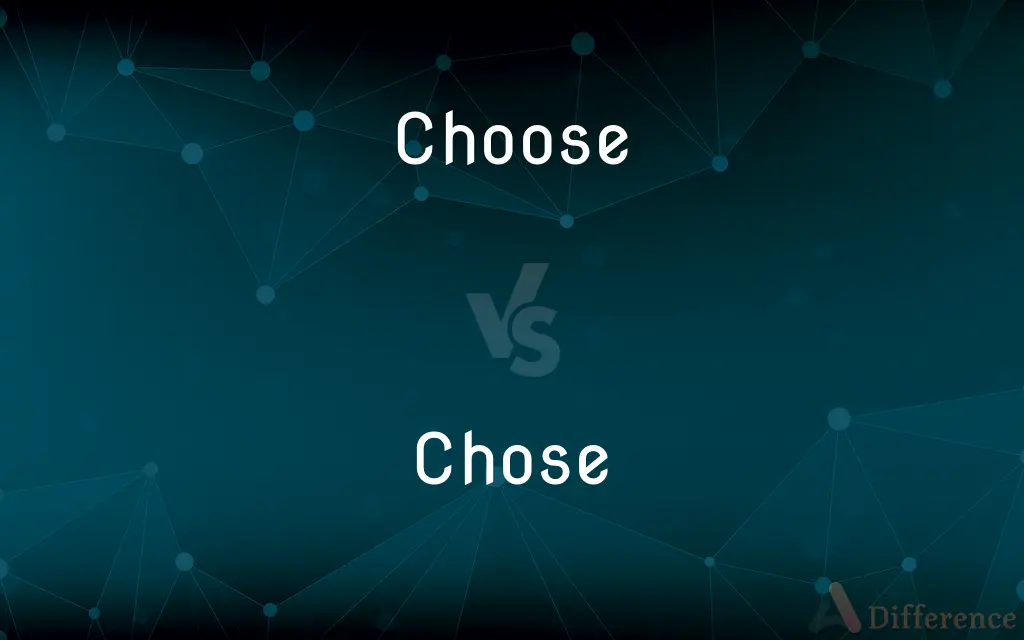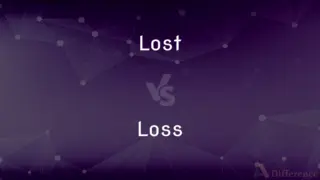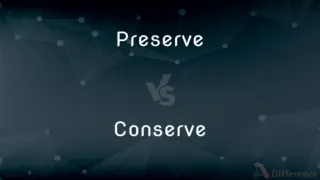Choose vs. Chose — What's the Difference?
Edited by Tayyaba Rehman — By Fiza Rafique — Updated on November 1, 2023
Choose is the present tense verb meaning to select. Chose is the past tense of the same verb.

Difference Between Choose and Chose
Table of Contents
ADVERTISEMENT
Key Differences
Choose and Chose are verbs that often cause confusion due to their similar spelling and pronunciation. Choose refers to the act of selecting or making a decision when faced with two or more possibilities. It is used in the present tense. For instance, "I always choose chocolate over vanilla." On the other hand, Chose is the past tense of Choose. It indicates that the selection or decision was made in the past. An example would be, "Yesterday, I chose the red dress."
In the context of everyday speech and writing, one might use Choose when discussing current options or future decisions. For instance, "Which ice cream flavor will you choose?" Chose, being in the past tense, would be used when reflecting on past decisions, like "Last summer, I chose to travel to Spain."
Using Choose and Chose correctly is essential for clear communication. If one says, "I choose to go to the park yesterday," it creates confusion because the verb tense does not match the time reference. Instead, it should be, "I chose to go to the park yesterday." Similarly, "Tomorrow, I chose the blue shirt" would be incorrect. It should be, "Tomorrow, I will choose the blue shirt."
In literature, both Choose and Chose find their place, helping to set the timeline of events. For example, in a story, a character might say, "I choose to confront him tomorrow," indicating a future event. In a flashback, the same character might reflect, "I remember the day I chose to stand up for myself."
Comparison Chart
Tense
Present
Past
ADVERTISEMENT
Use
Refers to current or future selections.
Indicates past decisions or selections.
Example
"I will choose the green shirt."
"I chose the blue shirt yesterday."
Common Mistake Scenario
"Which one will you choose?"
"Which one did you chose?"
Time Reference
"I choose to speak up now."
"I chose to remain silent last time."
Compare with Definitions
Choose
To decide or prefer.
I choose peace over chaos.
Chose
Past tense of the verb "choose" meaning to have selected something.
I chose the red apple.
Choose
To want; desire.
Which candy do you choose?
Chose
To have made a decision in the past.
He chose to stay silent during the meeting.
Choose
To make a choice, or select from two or more possibilities.
Given the options, I'll choose the latter.
Chose
To have picked out by preference.
Of all the dresses, she chose the blue one.
Choose
To pick out by preference from what is available.
She chose a ripe apple from the basket.
Chose
To have decided upon an action or course.
They chose to take the longer route.
Choose
To select from a number of possible alternatives; decide on and pick out
Which book did you choose at the library?.
Chose
Indicates a past selection or preference.
Out of all the offers, I chose the best one.
Choose
To prefer above others
Chooses the supermarket over the neighborhood grocery store.
Chose
Chose (pronounced: , French for "thing") is a term used in common law tradition to refer to rights in property, specifically a combined bundle of rights. A chose describes the enforcement right which a party possesses in an object.
Choose
To determine or decide
Chose to fly rather than drive.
Chose
Past tense of choose.
Choose
To make a choice; make a selection
Was used to doing as she chose.
Chose
An item of personal property; a chattel.
Choose
To pick; to make the choice of; to select.
I chose a nice ripe apple from the fruit bowl.
Chose
Past participle of choose
Choose
To elect.
He was chosen as president in 1990.
Chose
(legal) A thing; personal property.
Choose
To decide to act in a certain way.
I chose to walk to work today.
Chose
A thing; personal property.
Choose
To prefer; to wish; to desire.
Choose
(mathematics) The binomial coefficient of the previous and following number.
The number of distinct subsets of size k from a set of size n is or "n choose k".
Choose
The act of choosing; selection.
Choose
The power, right, or privilege of choosing; election.
Choose
To make choice of; to select; to take by way of preference from two or more objects offered; to elect; as, to choose the least of two evils.
Choose me for a humble friend.
Choose
To wish; to desire; to prefer.
The landlady now returned to know if we did not choose a more genteel apartment.
Choose
To make a selection; to decide.
They had only to choose between implicit obedience and open rebellion.
Choose
To do otherwise.
Thou canst not choose but know who I am.
Choose
Pick out, select, or choose from a number of alternatives;
Take any one of these cards
Choose a good husband for your daughter
She selected a pair of shoes from among the dozen the salesgirl had shown her
Choose
Select as an alternative; choose instead; prefer as an alternative;
I always choose the fish over the meat courses in this restaurant
She opted for the job on the East coast
Choose
See fit or proper to act in a certain way; decide to act in a certain way;
She chose not to attend classes and now she failed the exam
Choose
To select from a number of possibilities.
I will choose a movie for tonight.
Common Curiosities
How do I use Chose in a sentence?
Chose is used for past actions, e.g., "I chose chocolate ice cream."
How is Chose pronounced?
Chose is pronounced like "chohz."
What is the future tense of Choose?
The future tense is "will choose."
Which is the present tense: Choose or Chose?
Choose is the present tense.
What does Choose mean?
Choose means to select from a number of possibilities.
Is it correct to say "I didn't chose"?
No, it should be "I didn't choose."
Can I say "I will chose"?
No, it should be "I will choose."
Are Choose and Chose interchangeable?
No, Choose is present tense and Chose is past tense.
Can you give an example of Chose in a sentence?
Sure, "I chose the book on the left."
How do you form the negative with Choose?
"Do not choose" or "don't choose" for present tense; "did not choose" or "didn't choose" for past tense.
Can Chose indicate a decision made in the past?
Yes, e.g., "He chose to go by train."
Is "choosen" a correct form of Choose?
No, the correct past participle is "chosen."
How do you use Choose in a question?
For example, "Which one will you choose?"
Can Choose be used as a noun?
No, it's primarily used as a verb.
What is the difference between "I choose" and "I am choosing"?
"I choose" is simple present, while "I am choosing" is present continuous.
Share Your Discovery

Previous Comparison
Lost vs. Loss
Next Comparison
Preserve vs. ConserveAuthor Spotlight
Written by
Fiza RafiqueFiza Rafique is a skilled content writer at AskDifference.com, where she meticulously refines and enhances written pieces. Drawing from her vast editorial expertise, Fiza ensures clarity, accuracy, and precision in every article. Passionate about language, she continually seeks to elevate the quality of content for readers worldwide.
Edited by
Tayyaba RehmanTayyaba Rehman is a distinguished writer, currently serving as a primary contributor to askdifference.com. As a researcher in semantics and etymology, Tayyaba's passion for the complexity of languages and their distinctions has found a perfect home on the platform. Tayyaba delves into the intricacies of language, distinguishing between commonly confused words and phrases, thereby providing clarity for readers worldwide.














































